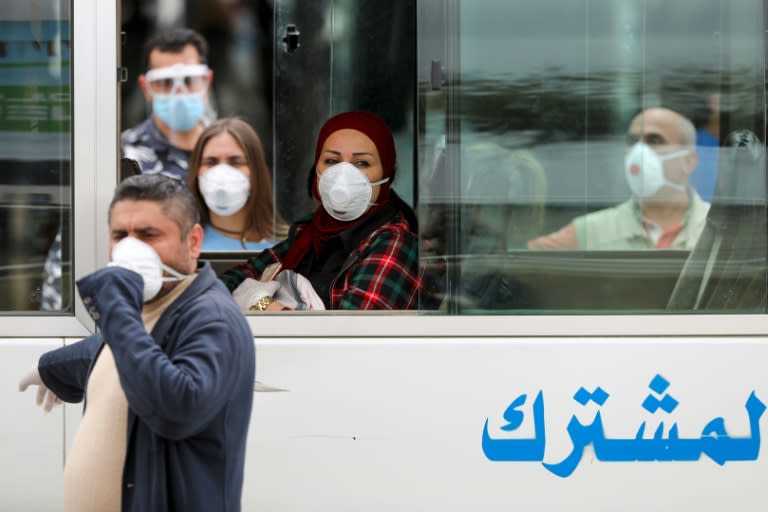
by thenational.ae — The Lebanese government further restricted travel in the country on Sunday, setting strict rules about the time and days that vehicles can be on the road in a bid to stem the rising number of coronavirus cases. In a decree on Sunday, the Interior Ministry laid out rules when cars, public vehicles and lorries can be on the road based on their number plates. Vehicles with plate numbers that end with an odd number are allowed to travel on Mondays, Wednesdays and Fridays while those with plate numbers that end with an even number (including zero) are allowed to travel on only Tuesdays, Thursdays and Saturdays. No one is allowed to travel on a Sunday.
The only exemptions are for essential workers – including pharmacists, doctors and nurses, the Red Cross and the media – as well as security and diplomatic traffic. Deliveries for vital sectors – including meat, flour, tobacco, water, milk, medical and fuel – will also be exempt. The Lebanese government announced a daily curfew to try to stop the spread of the disease, as the number rose again on Sunday by seven, bringing the national total to 527. There was also a death, bringing the toll to 18. Interior Minister Mohammad Fahmi said the new measures were put in place because of a “large number of citizens not abiding by the quarantine measures and the curbs on movement”. The first flight bringing home Lebanese nationals stranded overseas landed in Beirut on Sunday afternoon from Saudi Arabia. Lebanese media quoted the ambassador to Saudi Arabia, Fawzi Kabbara, saying that 1,500 people in the kingdom wanted to return to Beirut.
All arrivals will undergo testing and be quarantined in local hotels while waiting for results. Three other planes are expected on Sunday from other areas. The foreign ministry has said that 21,000 Lebanese nationals overseas have requested assistance returning home. “The government is concerned with every Lebanese at home and abroad and will work to remove sectarian, doctrinal, regional and political barriers,” Prime Minister Hassan Diab said.
Lebanon repatriates nationals in rare flights despite virus
Beirut (AFP) – Lebanon on Sunday started repatriating nationals who were stranded abroad in its first flights in weeks since it closed its international airport to stem the novel coronavirus. Many Lebanese work abroad, in the Gulf or in Africa, while thousands of youth study in Europe. The first of four planes touched down at the Beirut international airport late in the morning bringing in 78 passengers from Riyadh, local television reported. A second carrying 79 passengers from Abu Dhabi followed in the afternoon, the National News Agency said. Local television showed health personnel in protective gear taking the temperature of disembarking passengers. The Mediterranean country announced a lockdown and closed its airport from March 19 as part of measures to curb the spread of COVID-19, which has officially infected 527 people and killed 18 nationwide. An AFP photographer saw a dozen buses outside the airport, which the health ministry said were to transport the passengers to their homes to self-quarantine or to a hotel to await the results of tests on arrival. Prime Minister Hassan Diab had arrived earlier amid heavy deployment of the Lebanese army. Authorities said more than 20,000 people had signed up to be repatriated in total this week or at the end of the month.
Lebanese carrier Middle East Airlines said flights would land in Beirut later on Sunday from Lagos and Abidjan. It has also announced return trips to Paris, Madrid and Kinshasa on Tuesday. – Steep fares – Lebanese returning home must either test negative for the virus no longer than three days before their return, or be tested immediately upon arrival, according to government guidelines. They must pay for their own ticket and their families are not allowed to meet them at the airport. The government has said priority will be given to those with critical health conditions such as diabetes or cancer, those aged over 60 and under 18, and families. But critics have complained of steep ticket fares, while a financial crisis has severely restricted transactions from Lebanese bank accounts. Coronavirus is the latest crisis to hit Lebanon, which is already reeling under a crumbling economy. Due to an acute liquidity crisis, banks have since September increasingly been restricting access to dollars and have halted money transfers abroad.
On Monday, however, the banking association agreed to allow dollar transfers to Lebanese students outside the country to help them face the coronavirus pandemic, the finance ministry said. Diab on Sunday told reporters the government was studying the possibility of supporting returning Lebanese students with a ticket. The public transport minister said the MEA would offer half-price tickets to students in need, while the foreign and health ministers said Lebanese donors would cover the other half, according to the NNA. Lebanese expatriates and activists have clamoured online for MEA to lower the price of its tickets and help those who can’t afford it. The airline on Friday claimed tickets were more expensive — $650 for an economy class seat from Riyadh and $1,800 for a cheaper fare from Abidjan for example — because planes would be empty on the way out to evacuations.



